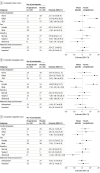Progesterone for Neurodevelopment in Fetuses With Congenital Heart Defects: A Randomized Clinical Trial
- PMID: 38805228
- PMCID: PMC11134212
- DOI: 10.1001/jamanetworkopen.2024.12291
Progesterone for Neurodevelopment in Fetuses With Congenital Heart Defects: A Randomized Clinical Trial
Abstract
Importance: Neurodevelopmental outcomes for children with congenital heart defects (CHD) have improved minimally over the past 20 years.
Objectives: To assess the feasibility and tolerability of maternal progesterone therapy as well as the magnitude of the effect on neurodevelopment for fetuses with CHD.
Design, setting, and participants: This double-blinded individually randomized parallel-group clinical trial of vaginal natural progesterone therapy vs placebo in participants carrying fetuses with CHD was conducted between July 2014 and November 2021 at a quaternary care children's hospital. Participants included maternal-fetal dyads where the fetus had CHD identified before 28 weeks' gestational age and was likely to need surgery with cardiopulmonary bypass in the neonatal period. Exclusion criteria included a major genetic or extracardiac anomaly other than 22q11 deletion syndrome and known contraindication to progesterone. Statistical analysis was performed June 2022 to April 2024.
Intervention: Participants were 1:1 block-randomized to vaginal progesterone or placebo by diagnosis: hypoplastic left heart syndrome (HLHS), transposition of the great arteries (TGA), and other CHD diagnoses. Treatment was administered twice daily between 28 and up to 39 weeks' gestational age.
Main outcomes and measures: The primary outcome was the motor score of the Bayley Scales of Infant and Toddler Development-III; secondary outcomes included language and cognitive scales. Exploratory prespecified subgroups included cardiac diagnosis, fetal sex, genetic profile, and maternal fetal environment.
Results: The 102 enrolled fetuses primarily had HLHS (n = 52 [50.9%]) and TGA (n = 38 [37.3%]), were more frequently male (n = 67 [65.7%]), and without genetic anomalies (n = 61 [59.8%]). The mean motor score differed by 2.5 units (90% CI, -1.9 to 6.9 units; P = .34) for progesterone compared with placebo, a value not statistically different from 0. Exploratory subgroup analyses suggested treatment heterogeneity for the motor score for cardiac diagnosis (P for interaction = .03) and fetal sex (P for interaction = .04), but not genetic profile (P for interaction = .16) or maternal-fetal environment (P for interaction = .70).
Conclusions and relevance: In this randomized clinical trial of maternal progesterone therapy, the overall effect was not statistically different from 0. Subgroup analyses suggest heterogeneity of the response to progesterone among CHD diagnosis and fetal sex.
Trial registration: ClinicalTrials.gov Identifier: NCT02133573.
Conflict of interest statement
Figures


References
Publication types
MeSH terms
Substances
Associated data
Grants and funding
LinkOut - more resources
Full Text Sources
Medical
Miscellaneous

